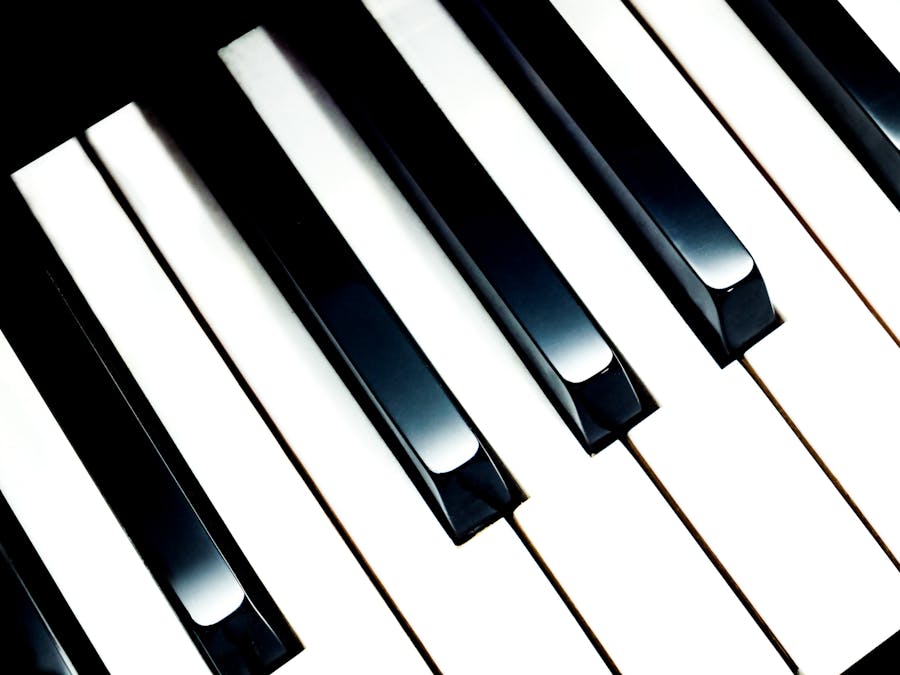 Piano Guidance
Piano Guidance
 Piano Guidance
Piano Guidance

 Photo: Roberto Hund
Photo: Roberto Hund
The ability to identify a note on the musical scale without a single reference point - known as absolute or perfect pitch - is a rarity even among musicians, but new studies with infants suggest that everyone may begin life with this remarkable talent.

36 black keys A typical piano has 36 black keys and 52 white keys. That's 88 piano keys total. Every twelve keys on the piano (seven white keys and...
Read More »
Basic piano chords often consist of only two or three notes, while the more advanced chords tend to incorporate even more notes. ... Common major...
Read More »SAN FRANCISCO - The ability to identify a note on the musical scale without a single reference point - known as absolute or perfect pitch - is a rarity even among musicians, but new studies with infants suggest that everyone may begin life with this remarkable talent. Psychologist Jenny Saffran, director of the Infant Learning Laboratory at the University of Wisconsin-Madison, has discovered this latest evidence of the complex architecture babies use to acquire knowledge. The work provides another example of how infants and adults hear and process sounds in fundamentally different ways. In past studies, Saffran has demonstrated that infants use statistical learning, or the practice of detecting consistent patterns in sounds, as a foundation for learning language. For example, statistical learning helps babies define where individual words begin and end in a spoken sentence. As in language, Saffran is now showing that infants apply these same talents as "little statisticians" to understanding music. In a test for infants and adults, Saffran devised a way to measure whether subjects show a preference for absolute or relative pitch in recognizing different tunes. Relative pitch, unlike absolute pitch, relies on tracking intervals between notes. Not surprisingly, the adults in her test all performed well on measures of relative pitch and poorly on absolute pitch. But the infants showed exactly the opposite pattern, excelling at absolute pitch but unable to recognize changes in relative pitch. "We certainly know that infants are not blank slates, and that they enter the world with a structure or hard-wiring that helps them learn," Saffran says. "But what's interesting here is we may not have dedicated hardware just for language. The structure is probably general to many complex forms of learning, including music." Saffran presented her work, which appeared in the January 2001 issue of the journal Developmental Psychology, at the annual conference of the American Association for the Advancement of Science Monday, Feb. 19, in San Francisco. Saffran was part of a symposium discussing some of the innate tools that help infants with the complex task of learning language.

Singing is a learned skill, not a 'gift' we're born with.
Read More »
Notes and rhythms, as well as music theory, are based on math. Reading music and counting rhythms require math skills. Studies have shown that...
Read More »
Pianoforall is one of the most popular online piano courses online and has helped over 450,000 students around the world achieve their dream of playing beautiful piano for over a decade.
Learn More »Why would absolute pitch come as standard operating equipment, only to fade from our grasp when we grow up? Saffran says it may have something to do with the way the brain responds to tones and frequencies, with so-called tonotopic maps. The brain's neurons are organized to respond to sounds in a particular frequency band. We map our aural worlds based on pitches of sounds in the same we visually map a room by spatially identifying objects. Absolute pitch provides a remarkably detailed tool for this cartography of sound, giving infants the ability to track extremely fine-grained information regarding everything they hear. But people eventually lose absolute pitch, Saffran argues, because it is simply too detailed to be functional in everyday life. "Absolute pitch is too fine a form of categorization," she says. "If that's all we knew, we couldn't generalize any of the sounds we hear. If we only used absolute pitch as adults, we wouldn't understand that 'Happy Birthday' in two different pitches is the same song, or that the word 'cup' spoken by a man and a woman was the same word." With absolute pitch, it may be a case of use it or lose it. Saffran says there are many studies indicating that people who learn musical instruments at a very young age have a higher incidence of absolute pitch. There are also studies showing a higher incidence among people who are blind, since the pitch of a moving car or a person's footsteps can provide important spatial cues. One the other hand, absolute pitch also has important implications for learning language, Saffran says. Consider that one-third of the world's languages are tonal languages, and absolute pitch is needed to understand the subtle differences between similar-sounding words. These languages include Cantonese, Hmong, Mandarin, Thai and Vietnamese. Human language may be the most complex product of the human mind, Saffran says, and it's something 1-year-old babies accomplish with remarkable efficiency. She says her research findings further reveal the false dichotomy of the nature vs. nurture debate, Saffran says, by showing how both biology and experience work together in complex knowledge acquisition.

Power chords are often used in rock music, and are also known as fifth chords. They're called fifth chords because they're made from the root note...
Read More »
Casio electronic musical keyboards were first manufactured in June 1979 and continue to be made by Casio today. The original Casiotone line was...
Read More »
Pianoforall is one of the most popular online piano courses online and has helped over 450,000 students around the world achieve their dream of playing beautiful piano for over a decade.
Learn More »
According to one version of its origin, pianos were set alight by RAF pilots to avoid piano lessons aimed at improving their dexterity and general...
Read More »
Simply Piano has a slightly different pricing structure. You can start with a seven-day free trial to help you see if this is the app for teaching...
Read More »